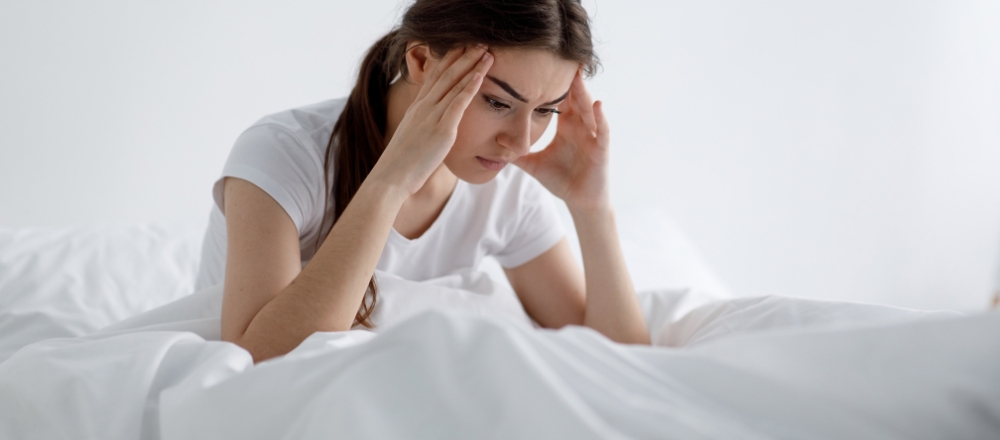Have you ever been unable to fall asleep in the middle of the night and been tossing and turning? It’s common to experience occasional insomnia, which is frequently brought on by changes in your sleeping environment, late-night screen time, or that evening cup of coffee. However, insomnia may be a more serious issue if you find yourself lying awake nearly every night and finding it difficult to fall asleep despite your best efforts. The answer to your inquiry, “Why can’t I sleep at night?” is probably that. Millions of people’s lives are disturbed by insomnia, which affects around 10% of the global population. However, why does it occur? Does it happen to some people more often than others? Above all, how can you manage it and take back control of your sleep?
The effects of insomnia extend beyond restless nights, which may infiltrate your workday and interfere with your ability to focus or recall specifics. You get more irritable or nervous as a result. The first step in figuring out how to improve sleep and feel better all day is to understand what causes insomnia.
Why Sleeping Is Necessary?
According to research, sleep refuels and re-energizes your body, so an average adult needs 6 to 8 hours of sleep per day for optimal health and function. But research indicates that more than 60% of adults consistently don’t get the required amount of sleep. The body uses signals from our circadian clock, which regulates our daily rhythms, and elevated levels of the neurotransmitter adenosine to induce sleep. Together, these two systems determine when it’s best for us to go to bed. The majority of us reach our highest “sleepiness” levels between the hours of 12 and 6 am and 2 and 4 pm.
Lack of sleep has negative effects on both the body and the psyche. Our circadian rhythm controls a number of bodily processes, such as blood pressure, body temperature, hormone levels, and digestive enzyme levels. In a study on human sleep deprivation conducted by the University of Chicago, participants who slept for only four hours a night for six days in a row had higher blood pressure, higher levels of the stress hormone cortisol, and lower levels of antibodies to a flu vaccine. Additionally, they displayed insulin resistance, which is an indication of type 2 diabetes.
What Is The Impact Of Insufficient Sleep In Our Daily Lives?
Insomnia has far more consequences than just making you feel exhausted. The clarity of your brain can be directly impacted by not getting enough good sleep. Getting enough sleep makes it more difficult to concentrate, retain important facts, and even make decisions that appear straightforward. Imagine finding it difficult to complete a routine work assignment or forgetting a crucial conversation you had with a friend.
There’s the emotional aspect as well. Lack of sleep can affect your mood by making you more irritated or prone to getting angry. As conversations grow strained, this can have an impact on both personal and professional relationships. Because exhaustion reduces your tolerance and patience, you may find yourself losing your temper with a family member or misinterpreting the intentions of a coworker.
How To Treat Sleep Deprivation Effects?
Adults should concentrate on making up lost sleep throughout the weekend if they don’t get the required amount of sleep during the workweek. For a healthy lifestyle, getting enough sleep is just as crucial as eating right and exercising. For people with hectic schedules, repaying sleep debt can be difficult, but even a few extra hours of sleep each night the next week makes a big difference.
You must sleep with the alarm off a couple of days a week in order to wake up feeling rejuvenated and at ease, even if it may take several weeks or even months to completely reverse the negative consequences of sleep deprivation. Avoiding a fresh cycle of debt is equally important. Plan your days and nights in accordance with your sleep requirements.
When it comes to treating insomnia, creating better practices might make all the difference. Here are a few simple methods to enhance the quality of your sleep:
- Maintain a regular sleep schedule. Even on the weekends, make sure you go to bed and wake up at the same time every day.
- Establish a relaxing atmosphere: Make sure your bedroom is dark, quiet, and cool. If necessary, think about using a white noise machine or blackout curtains.
- Cut down on daytime naps: Try to take a quick nap early in the afternoon if you must.
- Be mindful of what you consume: Steer clear of large meals, caffeine, and alcohol right before bed.
There isn’t a single lifestyle modification that works for everyone, but gradually changing behaviors can help create a stronger basis for sleep. The majority of doctor talks about how stress-reduction strategies might improve sleep. Before going to bed, practices like yoga or deep breathing techniques can help relax the mind and lessen anxiety, which is frequently connected to insomnia.
Note: To get back on track, think about looking into specialized fatigue services if you’re dealing with persistent exhaustion and it seems like sleeplessness is controlling your everyday activities.











